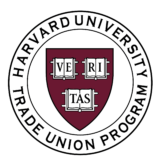Senior Advisor to the Executive Director, Solidarity Center (AFL-CIO)
former AFL-CIO (management)
1975
I cover National Press Club’s headline and newsmaker events (think governors, Cabinet members, other politicians, book authors, journalism awards etc.) as a reporter for the Club’s newswire. I once covered Maine as a UPI reporter. Later I worked as a National Desk copy editor for The Washington Post. A few years after HTUP, I attended Cornell graduate school on a scholarship and joined the Cornell ILR Extension School faculty. I taught courses on grievance administration and collective bargaining. The AFL-CIO Department for Professional Employees then hired me in 1982 after Cornell graduate school. I rejoined UPI briefly in Washington in 1984. The Washington Post hired me on their National Copy Desk. I became adjunct faculty at the George Meany Center for Labor Studies teaching courses on newswriting and editing, collective bargaining (public and private sectors) and created classes on ethical decision-making and effective writing for union leaders. I was adjunct faculty before becoming a fulltime employee in 1991. I was faculty chair (aka Curriculum Committee Chair) at what became the National Labor College until 1998. AFL-CIO President John Sweeney then assigned me to the AFL-CIO European Office as the first woman to represent the federation at the OECD in Paris and the ILO in Geneva, and the ITUC in Brussels. For 5 1/4 years I represented the AFL-CIO along with the head of our European Office and returned to run the AFL-CIO’s Solidarity Center’s Global Office in Washington before being promoted to Senior Advisory to the Executive Director until I retired in 2007. [I then traveled overseas to run SC trainings for several years after retirement.]
What impact has the HTUP had on your life/career? I think HTUP toughened me as a young woman in a male-dominated field. It challenged me to persevere under sometimes harrowing circumstances. It helped identify my strengths and pointed a path to further growth. I especially loved the international participants in my class. I felt so close to my African brothers. Can you see me smile Tamba Yambasu?
I think I had an impact on HTUP in several ways. One stands out: Don’t ever have a semester-long class of 27 with only one woman. What were you thinking?
Do you have an interesting/funny story of when you attended the program? It’s 1975. The 57th class of the Harvard Trade Union Program’s has just begun. We’re American union representatives, U.S. foreign service officers, and union leaders from South Africa, Nigeria, Kenya, Botswana, Sierra Leone, Sri Lanka, Malaysia, Jordan, and Australia. I’m the only woman.
TUP Executive Director Joe O’Donnell has just given us an unusual assignment for the next day: Introduce yourself in two or three minutes. However, you cannot mention your job or your work. After that first session ended, I returned to our empty classroom. I stood alone at the podium before the empty seats my classmates would fill tomorrow. I wanted to occupy that exact space I’d speak from the next day. I figured I’d be less afraid if I stood there once and made it familiar. I was 27.
It worked. Whatever I said that day is lost in time. Maybe words about summers on two-week horseback trips into the Wind River Range at age 13 and 14, or riding J.C. to The Chapel of the Transfiguration when we tied our horses to the chapel’s hitching post with the Teton Range as a backdrop. A far cry from my Manhattan childhood. Or maybe I spoke of my hero, my Dad, who had a massive coronary in his early 30s. The same guy who told me he could beat up eleven and a half lions when I asked him how strong he was. I was five.
Before Harvard, I led a nationwide strike against United Press International. I had covered the state of Maine as a reporter before working for the union representing all UPI and Associated Press employees from Maine to Hawaii. White House reporter Helen Thomas blanketed the TV news carrying her picket sign. Management was enraged. We soon settled.
HTUP classes on Parliamentary procedure class enlightened us. It came in handy in union politics and even on my Episcopal church vestry when I became Senior Warden. HTUP’s Bob Segal fiercely taught us labor law. He laughed when I once asked him for a hint about a case name during one of his oral quizzes. Law profs don’t give hints I learned to much merriment. Other teachers of labor history, economics, collective bargaining were standouts too.
One big oops had a happy ending: TUP program director Joe, in a history class said that if I weren’t there, he’d tell us what so-and-so really said (salty language, a series of profanities). In that moment, it felt like every head turned toward me. When that class ended, I went to his office. Joe, I said, do you realize what you did when you singled me out? Without me, you could tell the class the real story. How could anyone in that room not resent me? Was that your intention? He apologized. We became friends. He later described me in a letter of recommendation as “a formidable adversary.”
There are stories I’ll spare you.. I think HTUP may have learned something. Don’t ever hold semester-long session with only one woman.
CONTACT INFORMATION
414 New Jersey Ave SE, Washington, DC, United States, 20003-4008
ldwalsh@earthlink.net
